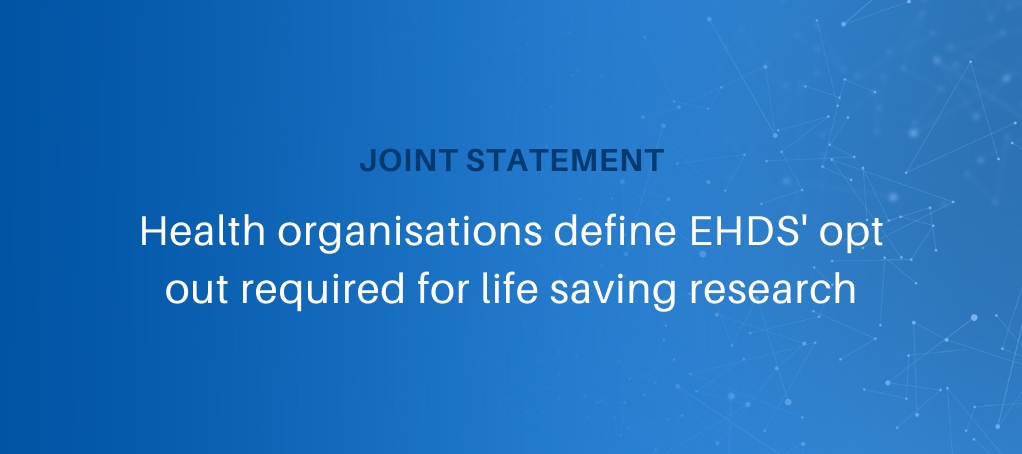Joint Statement: health organisations define EHDS’ opt out required for life saving research
9 Jun 2023
On the 6th of June, EORTC joined together with 31 other health stakeholders to share views on specific recommendations for a potential opt-out mechanism in the future EHDS.
These organisations and initiatives have joined forces because they all share the view that health data are precious and renewable resources that can power decision-making for clinical care, deliver life-saving innovations, and strengthen health systems in the 21st century.
Discussions in the EU policy-making process now include proposals for an opt-out mechanism for citizens to withdraw their data from secondary use purposes (that is, from research, regulatory purposes and evidence-based policy making). The original European Commission proposal did not include this mechanism.
The group of stakeholders support the approach taken in the Commission’s original legislative proposal from May 2022 as it strikes a sensible balance between the protection of personal data while enabling the use of data for research and innovation to create tangible benefits for patients and citizens. The stakeholders raised concerns about the real risk that data bias will form part of the EHDS from its inception and thus undermine its principal value for secondary use research purposes if an opt-out or opt-in mechanism is approved, and call for an impact assessment that will inform the implementation of this policy option.
If the proposals for opt-out are approved in the final EHDS legislation, the group make six recommendations. They believe the opt-out mechanism should:
- be applicable across all Health Data Access Bodies in EU Member States, limiting the scope of national derogation and ensuring that the technical specifications are aligned.
- consider the impact on health and care professionals and other data holders.
- be capable of implementation across the EU, without limiting lawful and ethical data sharing for secondary purposes.
- be routinely monitored as part of a regularly updated HealthData@EU data governance framework.
- have a limited, but well-defined, consistent and transparent scope.
- have necessary investment, infrastructure and budget to ensure sufficient transparency so that citizens are well informed of the opt-out.
Finally, the current debate on enabling the secondary use of health data in Europe highlights the need to achieve stakeholder alignment where possible on the implementation journey ahead for the EHDS. It also speaks to the need for implementation decisions to be highly informed by those with experience and responsibilities for on-the-ground implementation. This reiterates a need for strong, balanced and inclusive stakeholder representation within the governance model of the EHDS such as its Board of Directors.
Read the full statement here.

Related News
Meet the new EORTC Board
9 Jul 2024
We are pleased to announce the release of the EORTC 2023 Annual Report
17 Jun 2024
Dr Denis Lacombe, EORTC CEO, appointed stakeholder co-chair of ACT EU advisory group
24 May 2024
Clinical Trials Day 2024: a Q&A on pragmatic clinical trials
20 May 2024
EORTC/EMA workshop suggests an international way forward for treatment optimisation studies
8 May 2024
EORTC’s Participation at the ESTRO Congress 2024
29 Apr 2024
EORTC: Advancing research and treatment for rare cancers
29 Feb 2024
EORTC Fellowship Programme: celebrating more than 20 years of impactful collaboration
22 Feb 2024
Appointment of Malte Peters as EORTC Strategic Alliance Officer
9 Feb 2024
Unique series of workshops in partnership with the European Medicines Agency (EMA)
7 Feb 2024


